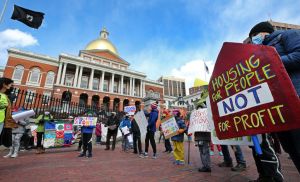
Source: Boston Globe / Getty
A new study highlights the challenges Black families are facing in the wake of the COVID-19 pandemic as workers struggle to make ends meet in order to prevent eviction. Last week Congress approved the $1.9T COVID-19 relief bill which allocates $50 billion for rental assistance, but the national eviction ban is set to expire at the end of this month and time is of the essence.
Almost 10 million Americans are behind on their rent payments, according to the U.S. Census Bureau.
Data derived from a Feb. 3-15 U.S. Census Pulse study showed that “30% of Black families reported not being caught up on rent or mortgage payments, vs. 17% of all families.”
40% of Black families said they were unsure if they would be able to make their next payment on time, in comparison to 24% of all families. In addition, “50% of Black families reported that they were somewhat or very likely to face eviction or foreclosure in the next two months, vs 36% of all families.”
The threat of homelessness is pervasive for Black families who are dealing with two pandemics at once, racism and COVID-19.
“The COVID-19 pandemic has negatively impacted the health and well-being of individuals—like Black Americans—who have been historically disadvantaged in the United States,” a report by Child Care,, the nation’s leading research organization focused on youth and children, reads. “More specifically, the pandemic has exacerbated longstanding inequities in income, food security, and access to affordable, stable housing for Black families. These existing inequities are an extension of the nation’s history of systemic and institutionalized racism, including discriminatory housing policies.”
In majority Black cities like Newark, New Jersey, Black residents are disadvantaged very close to the national averages reported above. Even though New Jersey residents were offered a two-month extension on the moratorium, the fear of losing their homes remains.
A Dec. 2020 report by What Works Cities found that “nearly 80 percent of city residents are renters, the highest percentage of all U.S. cities. Most tenants spend 35 percent or more of their monthly income on rent, well above the national average.”
In the South Ward neighborhood of Newark, 65% of Black participants in the study said to make their rent or mortgage payments on time, while 52% said they have missed or delayed a payment at the start of the pandemic. For these residents, moving does not absolve their struggles. 21% of participants said they experienced discrimination when they ventured out to look for affordable housing.
Child Care recommends seven initiatives to federal authorities to help fill in the gap. One step requires that the federal government to provides early care and education policymakers with equity training, as well as collecting and using data to formulate accountability standards.
SEE ALSO:
Tenant Charged With Brutally Killing Landlord Over Unpaid Rent As The U.S. Braces For Mass Evictions
Here’s Why Holding Off Evictions And Foreclosures Isn’t Enough For Black People During COVID-19
1 in 3 Black Families Were Behind On Rent And Mortgage Payments In February As National Eviction Ban Is Set To Expire was originally published on newsone.com







